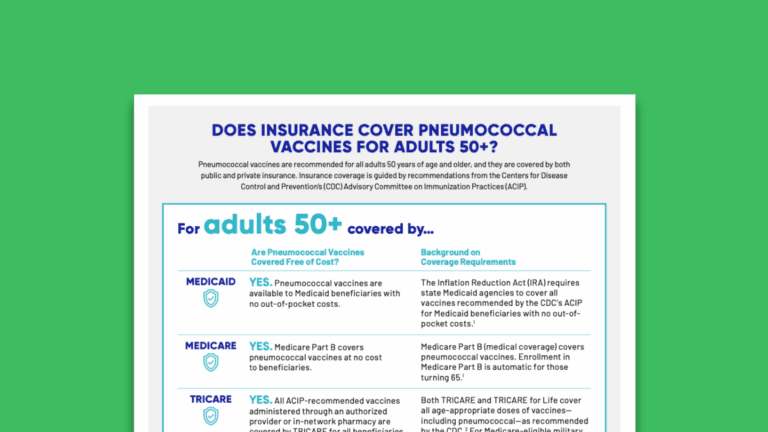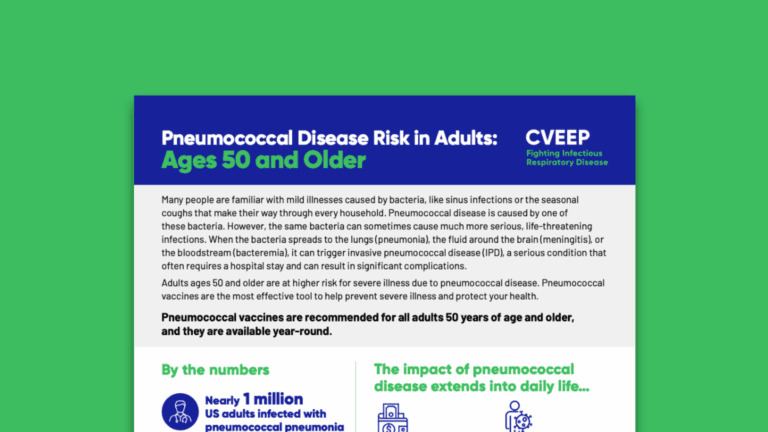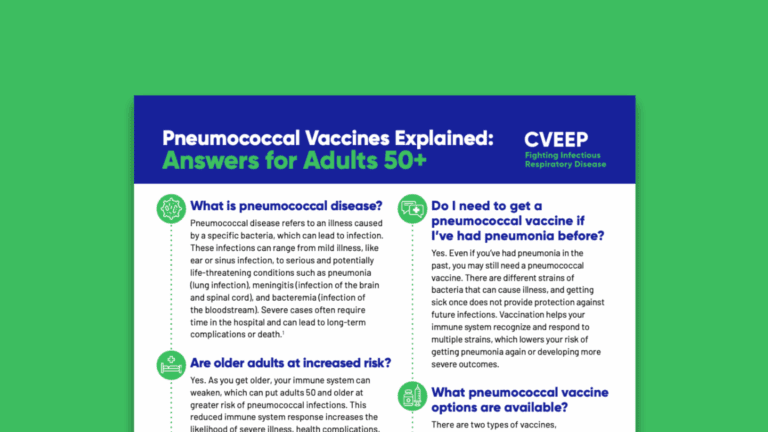Vaccines: Guidelines & Recommendations
Need vaccine information?
Check out the resources below.
Visit
Visit
Vaccines offer our best protection against severe illness from respiratory diseases.
Vaccines help protect against more than 20 life-threatening diseases—including infectious respiratory diseases. For decades, vaccines have saved millions of lives and greatly reduced the spread of deadly diseases all over the world. Staying up to date with recommended vaccines is the best way to help protect yourself, those you love, and your community from infectious respiratory disease. Learn more about the vaccines available to protect against infectious respiratory disease.
COVID-19
Who needs to be protected?
FDA-approved 2025-2026 COVID-19 vaccines are recommended by the Centers for Disease Control and Prevention’s (CDC’s) Advisory Committee on Immunization Practices (ACIP) for those:
- 6 months to 64 years of age based on individual decision-making, also known as shared clinical decision-making.* Vaccination is most favorable for those at increased risk for severe COVID-19 disease.
- 65+ based on individual decision-making.
This recommendation does not require a prescription to receive a 2025-2026 COVID-19 vaccine, though encourages people to talk to a health care provider (e.g., doctor, nurse, pharmacist) to help them assess if the vaccine is right for them. COVID-19 vaccines should be available at your local pharmacy but call ahead to ensure availability.
COVID-19 vaccines are covered by both public (Medicaid and Medicare) and private insurance, including employer-sponsored insurance, without cost-sharing.
*In conversation with a healthcare provider, the decision to vaccinate is made based on individual characteristics, including risk factors, characteristics of the vaccine itself, and evidence of who may benefit from vaccination.
What COVID-19 vaccines are available?
Three COVID-19 vaccines are available in the U.S., including two mRNA vaccine options (Moderna and Pfizer) and one protein-based vaccine option (Novavax).
Many pharmacies offer a range of vaccines. Visit vaccines.gov to find a pharmacy near you.
Influenza (Flu)
Who needs to be protected?
Everyone is vulnerable to the flu, and the best way to help prevent it is by getting vaccinated. CDC recommends that everyone—with rare exceptions—6 months and older receive an updated flu vaccine each year. According to CDC, flu vaccines reduce the risk of severe disease by about 50%.
What flu vaccines are available?
Several types of flu vaccines are available. Depending on age and other factors, you may be recommended to receive a particular type of flu vaccine. Approved options include inactivated injectable, recombinant injectable, live attenuated nasal spray, high-dose, and adjuvanted flu vaccines.
Some types of flu vaccines are not recommended for older adults, pregnant women, or individuals who have certain health conditions, so check with a healthcare provider to choose the right option for you.
Pertussis (Whooping Cough)
Who needs to be protected?
CDC recommends that everyone — including infants, children, preteens, adults, and pregnant women — stay up to date with their whooping cough vaccines.
Because whooping cough is particularly dangerous for babies, vaccines are important for anyone who is around babies, including parents, siblings, grandparents, caregivers, and friends of the family.
What whooping cough vaccines are available?
There are two types of combination vaccines available to protect individuals from whooping cough and the vaccine you receive depends on age. Children younger than 7 years of age receive DTaP, while older children and adults receive Tdap. DTaP and Tdap vaccines also protect against diphtheria (“d”) and tetanus (“t”).
Pneumococcal Disease
Who needs to be protected?
The best way to help prevent pneumococcal disease is to get vaccinated. The Centers for Disease Control and Prevention (CDC) recommends the following groups stay up to date with their pneumococcal disease vaccines:
- Children younger than 5 years
- Children 2 through 18 years with certain risk conditions including chronic heart, liver, kidney and lung disease (including some cases of asthma), cochlear implants, and others
- Adults 19-49 years old with certain risk conditions, including chronic heart, liver, and lung disease, diabetes, cigarette smoking, and others
- Adults 50 years or older
What vaccine options are available?
CDC recommends two types of pneumococcal vaccines, pneumococcal conjugate vaccines (PCVs) and pneumococcal polysaccharide vaccines (PPSVs), based on age and past pneumococcal vaccination history. Talk to a healthcare provider to determine whether you should get a pneumococcal vaccine and which vaccine is right for you.
Respiratory Syncytial Virus (RSV)
Who needs to be protected?
The best way to help prevent RSV is to get vaccinated. The Centers for Disease Control and Prevention (CDC) recommends protection against RSV for the following groups:
- Infants and young children
- CDC recommends either maternal RSV vaccination or infant immunization to help prevent severe illness from RSV in infants and young children.
- CDC recommends that pregnant women receive an RSV vaccine between 32–36 weeks of pregnancy during RSV season (typically September through January*) to protect their infants at birth.
- If a child’s mother does not receive an RSV vaccine during pregnancy, CDC recommends giving a preventive antibody to the newborn after birth.
- CDC recommends that pregnant women receive an RSV vaccine between 32–36 weeks of pregnancy during RSV season (typically September through January*) to protect their infants at birth.
- CDC recommends either maternal RSV vaccination or infant immunization to help prevent severe illness from RSV in infants and young children.
- Adults ages 50 and older
- A single dose of RSV vaccine is recommended for:
- All adults age 75 and older
- Adults ages 50-74 who are at increased risk of severe illness from RSV (such as those with chronic heart or lung illness or those who are residents of long-term care facilities)
- A single dose of RSV vaccine is recommended for:
*RSV season can vary around the country. If you live in Alaska, Florida, or outside the continental U.S., talk to a healthcare provider about when RSV season is expected where you live.
What vaccine options are available?
- For adults ages 50 and older:
- Three RSV vaccines are available to help prevent RSV.
- For infants:
- Maternal vaccine: One maternal RSV vaccine is available. When given during pregnancy, it helps prevent RSV in infants after birth.
- Preventive antibodies for infants: Two options, nirsevimab or clesrovimab, are available for infants under 8 months born during or entering their first RSV season if:
- their mother did not receive the RSV vaccine during pregnancy,
- their mother’s RSV vaccine status is unknown, or
- their mother received the RSV vaccine less than 14 days prior to birth.
- Preventive antibody for some young children: Nirsevimab is also available for young children 8–19 months who are at increased risk for severe illness from RSV and are entering their second RSV season.


